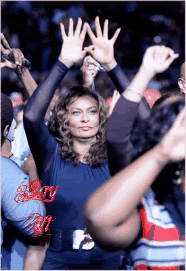Beyoncé - "Schoolin' Life"
Wednesday, December 3, 2008

Rosa Parks was her No. 1 fan, and Martin Luther King, Jr., called her the queen of American folk music. Odetta's stage presence was regal enough: planted on stage like an oak tree no one would dare cut down, wearing a guitar high on her chest, she could envelop Carnegie Hall with her powerful contralto as other vocalists might fill a phone booth. This was not some pruny European monarch but a stout, imperious queen of African-American music. She used that amazing instrument to bear witness to the pain and perseverance of her ancestors. Some folks sing songs. Odetta testified.
Her death on Dec. 2 in New York City at 77 from heart failure, coupled with that of South African singer Miriam Makeba three weeks ago, writes finis and fulfillment to 50 years of pursuing self-determination through song, of spreading the word through music. For a handful of black singers, their discography is an aural history, centuries deep, of abduction, enslavement, social and sexual abuse by the whites in power — and of the determination first to outlive the ignominy branded on the race, then to overcome it. In her commanding presence, charismatic delivery and determination to sing black truth to white power, Odetta was the female Paul Robeson.
Born in Birmingham, Ala., on New Year's Eve, 1930, and raised in Los Angeles, Odetta Holmes had a big voice early on; she was schooled in opera from the age of 13. Appearing in a tour of the musical Finian's Rainbow in her late teens, she started to lend her classical and musical-stage training to the folk repertoire around 1950. Like Harry Belafonte, Leon Bibb and Makeba, Odetta played the swanker nightclubs before the big (mostly white) folk-music surge kicked in later in the decade. Odetta Sings Ballads and Blues, the 1956 Tradition LP with definitively scalding interpretations of "Muleskinner, Easy Rider" and "God's Gonna Cut You Down," announced the arrival of a voice whose sonic and emotive power could raise the dead and reach the deaf. During the folk boom, each Odetta gig, in coffee house or a concert hall, was a master class of work songs, folk songs, church songs, and an eloquent tutorial in raw American history. Identifiable from the first syllable, her voice fused the thrill of gospel, the techniques of art song, — the wisdom that subtlety sometimes trumps volume — and the desperate wail of blues. If a line could be drawn from Bessie Smith to Janis Joplin, from Mahalia Jackson to Maria Callas, it would have to go through Odetta. Her resonance was literal, political — few civil rights rallies of the early '60s were complete without an Odetta rendition of "We shall Overcome" — and cultural. "The first thing that turned me on to folk singing was Odetta," Bob Dylan once said, and listening to that Tradition album helped persuade the young rocker to switch from electric to acoustic guitar. 
Odetta returned the favor in 1965, recording an LP of Dylan songs with an emphasis on the antiwar numbers rather than Dylan's sheaf of civil-rights ballads. In later years Odetta collaborated on a dozen or more albums (dueting with Nanci Griffith, for instance, on Other Voices, Too. She recorded a collection of Christmas spirituals, and did tribute albums to Ella Fitzgerald, Leadbelly and blues thrushes of the 1930s. In her 60s and 70s she still could sing the hide off a traditional number. Evidence: this rendition of "Midnight Special."
For Odetta and many other survivors of the Civil Rights Movement, the election of Barack Obama as president signaled a fulfilling chapter in the struggle. As she sank toward death in New York City, Odetta had an Obama poster taped on the wall across from her bed. Hospitalized with kidney failure on Monday, she kept willing herself to live because, her manager Doug Yeager wrote on a fansite just before her death, "Odetta believes she is going to sing at Obama's inauguration and I believe that is the reason she is still alive."
She sang of the past, and for the future. Come Jan. 20, her songs will be heard on the internal iTunes of the people she touched. Some voices can never be stilled.
Labels: News/Stories


















































































0 comments:
Post a Comment